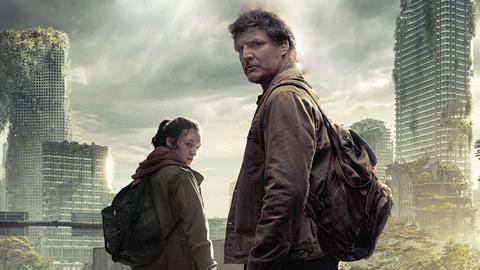The hugely popular post-apocalyptic HBO series is morally ambiguous, but full of Christian themes, says Rebecca Chapman

Not being a huge fan of on-screen gore, I’ve never been one for zombie movies. However, HBO’s latest pandemic-themed post-apocalyptic drama The Last of Us had me hooked from the very first episode.
You’d think pandemic-themed shows would be the last thing people wanted to watch right now, but with 30.4 million viewers across season one, The Last of Us has achieved the biggest cumulative audience for an HBO series since the final epic season of Game of Thrones in 2019.
Like Game of Thrones it is violent (perhaps no surprise given its video-game origins) with some strong language. Written and directed by Craig Mazin (HBO’s Chernobyl) and Neil Druckmann (co-creator of the original video game), it balances grief and despair with wit and warmth as it explores how humanity responds when civilisation has collapsed.
The plot
Set in the USA 20 years after a parasitic fungus has turned most people into zombie monsters, the music is haunting, the acting spot on, the detail incredible; John Nugent from Empire called the series a “masterpiece” which, for Nugent, is praise indeed!
But it’s not the exquisite and diverse casting, nor the acting, nor the brilliant cinematography that I’ve found so compelling, it’s how it showcases the struggle of what it is to be human, with all our potential and pain, and reminds us that no man (or woman) can be an island.
The Last of Us follows a smuggler named Joel, played by Pedro Pascal, who attempts to transport teenager Ellie (Bella Ramsey) across the country so that her immunity from the fungus can be investigated. It makes for moving, edge-of-your-seat stuff. A horror with heart and hope.
Like many Old Testament figures, Joel is a broken man, a shell still grieving a loss from two decades before. He remains terrified of further pain. He is so human it hurts – putting up walls to protect himself, only to have them broken down again. Here is a protagonist clearly so fallen, damaged and desperate that by the end he is driven to the depths of depravity. People become collateral damage to him, but truth too – and in the end, betrayal hurts more than the zombies (here called the ‘infected’).
Familial love is a strong theme of the show; the perseverance needed to keep doing what must be done to protect and provide for your child, day after day, come what may. In a world, and even a church, that can feel like it places a premium on families, here we see that unconditional parental love can take us to a primal place that can create intense fear and extreme behaviour. You can’t fail to be moved by one character, Henry, who does all he can to protect his little brother. The head of the resistance tells him to accept the inevitable – that “kids die”. She screams: “You think the whole world revolves around him? That he’s worth everything?” Without those they love, many of the characters see little to live for.
The Last of Us reminds us that sometimes the people you create biologically are not as similar to you as the people you meet. Friends too can become family – and an adopted child can be just as loved and valued as a biological one. The central relationship provides a reminder of the power of adoption to change lives, for both the adoptee and adopter. It is especially poignant for those of us who have confidence in our adoption into God’s family.
End times
While romantic love isn’t a focus for this show, we do see it briefly. Frank and Bill provide the focus for perhaps the most acclaimed episode with their LGBT long-term love story presented as an idyll that also poses challenging questions about assisted dying. If you are living in the end times, beauty is to be enjoyed, and every moment lived to the full.
Reflecting on the Book of Revelation, theologian Ian Paul reminds us that every generation of humanity has always thought they are on the very brink of the precipice. In those times we are warned to expect false prophets, and The Last of Us offers us just such a person, who is presented to us quoting Revelation 21 to his flock. This is a wolf in sheep’s clothing whose use of faith to justify abuse and murder is horrific.
As a character Ellie is an intriguing mix of adult and child, in some ways familiar to anyone who spends time with teenagers. Her innocent joy at truly awful puns reminds you of her youth, but we see the pull that her own potential for power and violence begins to exert on her. She is fascinated by guns, as if they are an accoutrement to adulthood. She knows they are dangerous, yet can’t help but want to play with them, to emulate the adults she sees with them. Like her carers, she understands that she too will eventually need these weapons to kill other people in order to stay safe.
The “us” and “them” of tribalism is ever present in the background of The Last of Us, with what is left of the federal government after it becomes a military dictatorship constantly fighting an unpredictable rebel group called the Fireflies. Neither group is covered in glory – there are wrongs on all sides. The mantra throughout is of “endure and survive”, but with the restrictions and authoritarianism imposed on those living in the military quarantine zones, are occupants living or merely alive? They have been saved from death, but what does it mean to be truly saved? Is it purely about physical rescue?
Saviour complex
Joel tries to be a saviour – “save who you can save” becomes his strapline – but it can be dangerous to strive to be a saviour when the person you most want to save is already dead. When saving one means sacrificing others, what significance does life hold? What if saving the world meant sacrificing your innocent child? Could you? Should you?
By the end of the series, the moral ambiguity feels overwhelming. Utilitarianism versus justice and love, collectivism versus individualism. Which philosophical system is better? Over the course of history, religion has been blamed for many conflicts, yet The Last of Us writer and director Craig Mazin noted that when looking at any intractable conflict “at some point you’re gonna find somebody doing something because of love. That love manifests as fear, hatred, xenophobia, racism, religious superiority. These things that start like little seeds grow into massive things that we can’t comprehend how to get out of.”
In a world where Andrew Tate can peddle his particular view of masculinity, it is good to see a show where fatherhood is a focus
Love changes everything in this show. Here it is is not saccharine, nor straightforward. We see that to love is to be vulnerable – Bill tells Frank “I was never afraid before you showed up”. Our choices to connect, to build community, to love, are the very things that make us human. Yet we fear not being able to provide for or protect those we love. Fear makes us take more than we need – did anyone else feel a compulsion to over-purchase toilet roll at any point over the last few years? Then later, looking at them stacked up, did you wonder what difference you thought toilet roll was going to make?
Love provides purpose. The powerful love driving Joel’s actions, and this whole story, is love for family. In a world where Andrew Tate can peddle his particular view of masculinity, it is good to see a show where fatherhood is a focus; where to provide and protect is something powerful and positive. A father’s love is what gives Joel his purpose back.
For Ellie, there is the hope that her blood might prove to be redemptive. We see her moving from an initial rejection of this idea to an unspoken prayer that it be true. These characters, in their life and (for some of them) in their death, find their purpose in serving others, in saving others.
In a post-pandemic world, as so much of our society returns to ‘normal’, The Last of Us is worth your time. Beautifully crafted and big-budget, sure, but it reminds us of how much we take for granted, and of the value of living life in all the fullness that Jesus promised. It shows us love and fear, tribalism and moral quandaries. There are no flawless heroes here – all have sinned and fallen far, far short.
But we are also reminded that we have greater purpose than ourselves. Painted on walls throughout the show we see the slogan “When you’re lost in the darkness, look for the light”. And isn’t that all any of us can do – turn to the light, Jesus Christ, who died to save humanity. Because the end times, like the next monster, could be just around the corner.




































No comments yet